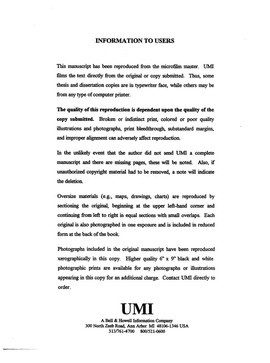| dc.contributor.advisor | Green, Gary, | en_US |
| dc.contributor.author | Barnhart, Lynn C. | en_US |
| dc.date.accessioned | 2013-08-16T12:30:18Z | |
| dc.date.available | 2013-08-16T12:30:18Z | |
| dc.date.issued | 1998 | en_US |
| dc.identifier.uri | https://hdl.handle.net/11244/5712 | |
| dc.description.abstract | The purpose of the study was to determine if the educational outcomes of the associate degree nursing program at a university in a southwestern state facilitated entry level competencies which are anticipated following three months of practice as a registered nurse. | en_US |
| dc.description.abstract | Findings. Analyses revealed that the internalization of the cognitive skills and the psychomotor skills taught in the nursing curriculum provided entry level competencies which enabled the neophyte nurse to practice competently the first three months of employment in a health care facility. A disparity existed in the leadership role expectation of the new graduate nurse by the health care employee and the educational outcome for leadership in the nursing curriculum. This disparity is compounded by the shortening of leadership orientation programs in the workplace due to the implementation of computerized licensure. | en_US |
| dc.description.abstract | Procedure. The criterion based sample consisted of 21 students who graduated from a National league of Nursing accreditated Associate Degree nursing program in a southwestern state between the years of 1990-1996. All participants were gainfully employed in a health care facility within a thirty mile radius of the university. A one-hour open-ended interview that addressed entry level competencies was conducted by the interviewer with each participant. | en_US |
| dc.description.abstract | Data Analysis. Five categories emerged by employing the process of theoretical sampling in this descriptive, inductive study. | en_US |
| dc.description.abstract | Conclusion. The entry level competencies learned in an associate degree curriculum supported the transition from the academic environment to the workplace. However, neophyte nurses were expected to function in a leadership role with minimal academic preparation. | en_US |
| dc.format.extent | x, 127 leaves ; | en_US |
| dc.subject | Nursing Study and teaching (Associate degree) | en_US |
| dc.subject | Health Sciences, Nursing. | en_US |
| dc.subject | Health Sciences, Education. | en_US |
| dc.subject | Associate degree nurses. | en_US |
| dc.title | Transfer of educational concepts of an associate degree nursing program to the workplace. | en_US |
| dc.type | Thesis | en_US |
| dc.thesis.degree | Ed.D. | en_US |
| dc.thesis.degreeDiscipline | Department of Educational Leadership and Policy Studies | en_US |
| dc.note | Adviser: Gary Green. | en_US |
| dc.note | Source: Dissertation Abstracts International, Volume: 59-09, Section: B, page: 4725. | en_US |
| ou.identifier | (UMI)AAI9905628 | en_US |
| ou.group | Jeannine Rainbolt College of Education::Department of Educational Leadership and Policy Studies | |
